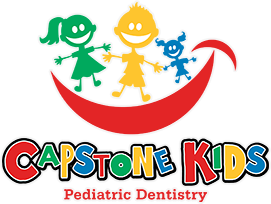FAQ
- Why should my child see a pediatric dentist instead of our regular family dentist?
Pediatric dentistry is a dental specialty that focuses on the oral health of young people. Following dental school, a pediatric dentist has two to three years additional specialty training in the unique needs of infants, children and adolescents, including those with special health needs.
- At what age should my child have his/her first dental visit?
"First visit by 1st birthday" is the general rule. To prevent dental problems, your child should see a pediatric dentist when the first tooth appears – usually between 6 and 12 months of age – and certainly no later than his/her 1st birthday.
- How should I clean my baby's teeth?
A toothbrush with soft bristles and a small head, especially one designed for infants, is the best choice for babies. Brushing at least once a day, at bedtime, will remove plaque bacteria that can lead to decay.
- What is baby bottle tooth decay, and how can I prevent it?
Baby bottle tooth decay is a pattern of rapid decay associated with prolonged nursing. It happens when a child goes to sleep while breast-feeding and/or bottle-feeding. During sleep, the flow of saliva is reduced, and the natural self-cleansing action of the mouth is diminished. Avoid nursing children to sleep or putting anything other than water in their bedtime bottle.
- How can I help my child through the teething stage?
When teeth erupt, sore gums are part of the normal eruption process. The discomfort is eased for some children by use of a teething biscuit, a piece of toast or a frozen teething ring. Your pharmacy should also have medications that can be rubbed on the gums to alleviate the discomfort.
- Can thumb sucking be harmful for my child's teeth?
Thumb and pacifier sucking habits that go on for a long period of time can create crowded, crooked teeth or bite problems. If children are still sucking their thumbs or fingers when their permanent teeth erupt, a mouth appliance may be recommended by your pediatric dentist. Most children stop these habits on their own.
- When should my child start using toothpaste and how much should s/he use?
The sooner the better! Parents should use a tiny amount (size of a rice grain) of fluoride toothpaste, on an age appropriate toothbrush, to brush baby teeth twice daily as soon as teeth erupt. Once children are 3-6 years old, the amount of toothpaste should be increased to a pea-size dollop. Remember, young children do not have the ability to effectively brush their teeth on their own (until they can tie their own shoes). Please assist your child's brushing and remind them to spit out (not swallow) excess toothpaste after brushing.
- If my child gets a toothache, what should I do?
To comfort your child, rinse his/her mouth with warm salt water, and apply a cold compress or ice wrapped in a cloth on your child's face if it is swollen. Do not put heat or aspirin on the sore area, but you may give the child acetaminophen for pain. Please see us as soon as possible.
- My child plays sports. How should I protect my child's teeth?
A mouth guard should be a top priority on your child's list of sports equipment. Athletic mouth protectors, or mouth guards, are made of soft plastic and fit comfortably to the shape of the upper teeth. They protect a child's teeth, lips, cheeks and gums from sports-related injuries. Any mouth guard works better than no mouth guard, but a custom-fitted mouth guard fitted by our dentist is your child's best protection against sports-related injuries.
- If my child gets a cavity in a baby tooth, should it still be filled?
Primary, or "baby," teeth are important for many reasons. Not only do they help children speak clearly and chew naturally, they also aid in forming a path that permanent teeth can follow when they are ready to erupt. Some of them are necessary until a child is 12 years old or older. Pain, infection of the gums and jaws, impairment of general health and premature loss of teeth are just a few of the problems that can happen when baby teeth are neglected. Also, because tooth decay is really an infection and will spread, decay on baby teeth can cause decay on permanent teeth. Proper care of baby teeth is instrumental in enhancing the health of your child.
- What should I do if my child knocks out a permanent tooth?
First of all, remain calm. If possible, find the tooth and hold it by the crown (top) rather than the root. Replace the tooth in the socket, and hold it there with clean gauze or a washcloth. If you can't put the tooth back in the socket, place the tooth in a clean container with milk or water, and take your child and the glass immediately to the pediatric dentist. Time is essential, so the faster you act, the better your chances of saving the tooth.
